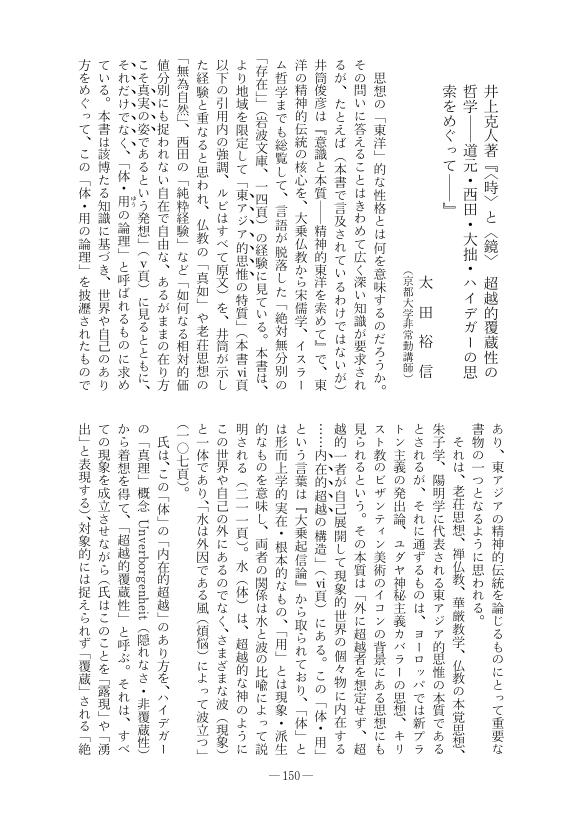4 0 0 0 OA 西田幾多郎とハイデガー 『存在と時間』 存在了解と自覚
- 著者
- 太田 裕信
- 出版者
- 西田哲学会
- 雑誌
- 西田哲学会年報 (ISSN:21881995)
- 巻号頁・発行日
- vol.9, pp.78-95, 2012 (Released:2020-03-22)
Many scholars such as Shizuteru Ueda and Ryousuke Ōhashi have insisted that Nishida’s philosophy has a close affinity with the work of Heidegger. However, there have been few comparisons drawn between them. The reason for this is that Nishida’s criticism of Heidegger is rather obscure and difficult to understand. In this paper, therefore, I want to explain his criticism of Heidegger and examine its validity, which will in turn make clear the essence of Nishida’s philosophy. The most important issue is the affinity and difference between their philosophical principles, as it is, a comprehension of being(Seinsverständnis) and self-awaking(Jikaku). In Self-awaking-determination of Nothingness, Nishida criticized Heidegger’s idea of “comprehension” as an incomplete idea of “self-awareness”. This issue relates to the concept of time and otherness. Nishida’s idea of time which he terms “self-determination of the Eternal Now” bears resemblance to Heidegger’s temporality(Zeitlichkeit), however, Nishida criticized Heidegger from his perspective of time which is grounded in his idea of otherness. Although there are many similarities between Heidegger and Nishida, we should acknowledge the important differences between “Seinsverständnis” and “Jikaku”. If we come to compare them more profoundly, we can see a picture of a concrete ontology of self which transcends the limitations of specific cultural frameworks.
1 0 0 0 OA 書評 中島吉弘著『梯明秀の物質哲学― 全自然史の思想と戦時下抵抗の研究』
- 著者
- 太田 裕信
- 出版者
- 西田哲学会
- 雑誌
- 西田哲学会年報 (ISSN:21881995)
- 巻号頁・発行日
- vol.15, pp.177-179, 2018 (Released:2020-01-29)
- 著者
- 太田 裕信
- 出版者
- 西田哲学会
- 雑誌
- 西田哲学会年報 (ISSN:21881995)
- 巻号頁・発行日
- vol.13, pp.150-153, 2016 (Released:2020-03-21)
1 0 0 0 OA 『年報第十号』書評
- 著者
- 太田 裕信
- 出版者
- 西田哲学会
- 雑誌
- 西田哲学会年報 (ISSN:21881995)
- 巻号頁・発行日
- vol.11, pp.148-151, 2014 (Released:2020-03-22)
- 著者
- 太田 裕信
- 出版者
- 日本宗教学会
- 雑誌
- 宗教研究 (ISSN:03873293)
- 巻号頁・発行日
- vol.86, no.1, pp.53-78, 2012
西田幾多郎は自身の哲学を「宗教」と密接に関わるものとして考えていたが、その「宗教」に本質的な契機として「罪悪」の問題がある。西田はその問題を初期から晩年に至るまで、親鶯やキリスト教の思想に触れながら度々論じている。本稿では、西田がこの「罪悪」の問題を「場所の論理」という存在論においてどのように考えていたかを論じる。西田は『哲学論文集第四』(一九四一年)において、キェルケゴールの『死に至る病』に書かれた「罪」の思想に共感しているから、本稿はキェルケゴールの思想との関係を論究の手がかりとする。西田は「罪悪」を単に道徳的な局面のものとしてではなく、「作られたものから作るものへ」と言われる自己の存在論的構造において考えている。より詳しく言えば「罪悪」を「対象的自己意識」と「意志」という二つの契機から考えている。そして、この問題は「逆対応」などの根本概念において表現されている西田の「宗教」思想の本質的な契機となっているのである。


